 ere's the last entry in this series. It doesn't exhaust the full collection of posters (there are 20 so far), but you can see them all if you follow the link at the bottom of this post.
ere's the last entry in this series. It doesn't exhaust the full collection of posters (there are 20 so far), but you can see them all if you follow the link at the bottom of this post.Again: These are caricatures, not scholarly definitions. If you click on the images, however, your browser will point you to some random samples of the kind of rhetoric that inspired these posters.
For an amusing glossary of more ECM jargon, see this entry at Anton Hein's "Apologetics Index."
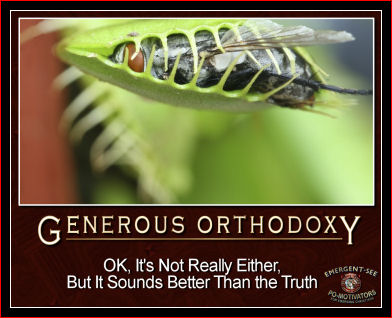
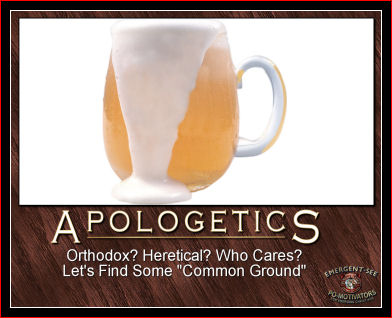
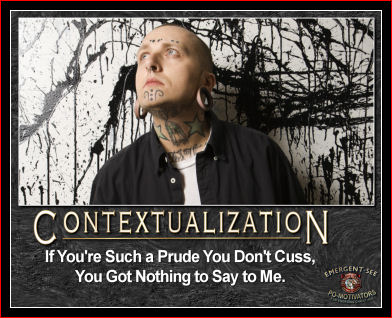
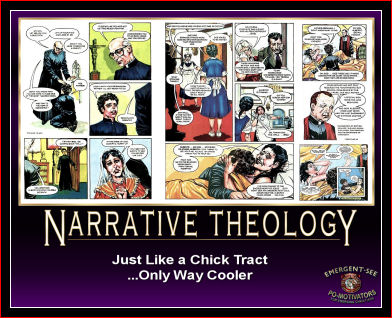

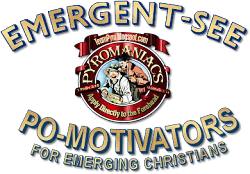 The entire collection, complete with links to hi-res images, can be reached by clicking on the graphic to the right. Feel free to print these out, post them on other blogs, or subject them to critical scrutiny. If you follow the link, you'll see the entries we haven't even posted here yet, but we gotta get back to the regular content of the blog. We hope these have helped unpack some of the jargon of post-evangelicalism for some who are groping for ways to explain it succinctly.
The entire collection, complete with links to hi-res images, can be reached by clicking on the graphic to the right. Feel free to print these out, post them on other blogs, or subject them to critical scrutiny. If you follow the link, you'll see the entries we haven't even posted here yet, but we gotta get back to the regular content of the blog. We hope these have helped unpack some of the jargon of post-evangelicalism for some who are groping for ways to explain it succinctly.We may add a few more posters in the days to come, so watch this site. We'd love to add posters as fast as the Emerging movement proliferates jargon, but we just can't keep up that pace.












64 comments:
We'd love to add posters as fast as the Emerging movement proliferates jargon, but we just can't keep up that pace.
- I know what you mean.
There has been quite an interesting argument with an emergent going on at Tony Rose's Blog.
Great images! Will definitely use them!
But let's be honest, the bible is primarily a human product and therefor irrelevant and dead in today's modern society. We shouldn't take this whole 'deity' thing too seriously. Can't we all just get along? Lets start a dialog...
Those are so fantastic.
Narrative Theology is something I've run into from time to time.
It seems like it certainly has it's place, but to over-emphasize it can be dangerous I would think.
Here's a quote I just read after clicking on the Chick tract poster:
"When you can capture the imagination of a person, then you have 'captured' that person," he observes. "If a truth cannot be imagined, how then can it ever be retained? If it cannot be retained, how can it transform? But if it could transform the individual through the imagination, how could it ever be forgotten?"
unloving... ;)
Allright Phil - I think you just won the conversation.
These wouldn't be so painfully funny (I spilled hot coffee on myself from laughter), it they weren't so painfully true. How challenging to see yourself as a parody.
I hate it when you have to explain the jokes. They're not systematic philosophies: they're -jokes-.
Paul:
According to wikipedia, "a metanarrative (sometimes master- or grand narrative) 'is a global or totalizing cultural narrative schema which orders and explains knowledge and experience'". It implies something larger than the events is happening. Really large-brained people would say that metanarrative speaks to the teleology of events -- that is, is says that they are going from some origin of purpose to some destination or ultimate outcome of purpose.
This is, btw, bad from the postmodern viewpoint. It implies that our minds should be shaped by the larger picture rather than merely content with the limits of our perceptions. For example, if I can't understand why adultery is a sin without having God explain it to me in Matthew 5 and Eph 5 -- that is, unless I can understand this without the metanarrative about marriage in God's purpose -- then I am being in some way manipulated into being less than the one who defines all terms in my world.
In that, when one rejects metanarrative, one then has all these texts in this thing we call the Bible, and they are just stories. They are good insofar as they say something to us in their immediate context, but (for example) for us to draw meaning from the crucifixion of Christ based on the sin of Adam (regardless of what Paul said about that) is unwarranted. Adam's creation is one story; Jesus' death is another. Don't try to connect them because the world doesn't work like that.
And in that, because the texts are not really useful, we are then purposed to live a story which reflects what we believe. Narrative theology says, in effect, that we can't tell someone else's story -- we can only tell our story, and hope that by living the same story as a community ultimately convince pothers to join our conversation and live like we live, more or less.
Wow. After posting that, I want to try to explain what that means.
"metanarrative" says "the stories are the parts of a larger story, and they all relate to each other."
"narrative theology" says "the texts are meaningless and we tell the story of what we believe by how we live."
I'm not sure that helps, but pheh on both their houses anyway.
Cent,
For example, if I can't understand why adultery is a sin without having God explain it to me in Matthew 5 and Eph 5 -- that is, unless I can understand this without the metanarrative about marriage in God's purpose -- then I am being in some way manipulated into being less than the one who defines all terms in my world.
I had to read that like 3 times to get it. Count me out for the "large-brained" category. Pheh.
Though I guess I stand on the opposite end of the aisle, I have to admit that most of these are pretty dang funny. (But what when someone starts pigeonholing Reformed Baptists with dead-on photos and quips?! We must wait and see...) All these postcards, with their attendant links...makes me want to say "Do me next!" But where would you begin..?
A technical question? Did you purchase stock photos from something like Getty Images, or do you know models who fit all those descriptions? Maybe you got 'em from RTS, particularly the punky-lookin' ones...I recall being surprised a few years ago when flipping through Christianity Today, only to find some RTS ads featuring men with--gasp!--earrings!
Oh, how cool we've all become.
"(for example) for us to draw meaning from the crucifixion of Christ based on the sin of Adam (regardless of what Paul said about that) is unwarranted."
That's not good.
Thanks for sharing Frank. I think I'm begining to sort of understand this confusing Narrative Theology thing.
Paul:
The Bible, apparently, cannot be understood outside the context of liturgy. Forget that it wasn't written in the context of liturgy: unless we are receiving it in the community through method rather than word, we are working out a lost cause.
__________
Mike:
The photos generally come from stock photo sites that don;t charge anything for non-commercial use. stock.xchng is a fav of TeamPyro.
As for retributions, we'll see if they have time for that or if they're too buying doing things ... like ministry.
Such mean-spiritedness! I'm shocked, shocked! I am about to swoon! He'p me, he'p me somebody! Oh, the humanity!
Regarding the "Apologetics" picture....
mmmmmmmmm.... beeeeeeer.
Only one problem, it's too light! But, I do like the foamy head spilling down the glass mug!
Golly, I'd like a Yuengling Lager right now.
Cheers! Ps. 104:15
Generous Orthodoxy:
We figured it out when we said nobody has it figured out.
My only qualm is the possible impugning of an innocent beer by intimating direct association with the indefensible "beliefs" of ECMers!
I dunno...the whole ECM as I have encountered it described by proponents in ECM blogs and by critics here sounds just like watered-down, liberal mainline Christianity of the last oh-I-don't-know-how-many-years. Methinks it isn't even really new.
I was an anti-metanarrative iconoclast 15 years ago, without realizing that "metanarrative" was a term. Hasn't Higher Criticism—the whole JEDP thing—and the Jesus Seminar been all about doing away with metanarratives? Weren't Joseph Campbell and other Jungian mythologists all about equating the Judeo-Christian metanarrative with ancient Sumerian or Mithraist or Gnostic metanarratives? Isn't cultural and moral relativism all about positing that we cannot claim that our way of thinking is superior to some other person's or group's way of thinking?
Is there anything really new or cutting edge about any of this?
(I suppose at this point, someone will come along and claim that Cent has completely misdefined metanarrative or that I'm completely mischaracterizing the ECM, but whatever.)
As an afterthought a propos of nothing, when I was growing up, modernism to me meant Bauhaus and Bernstein, and postmodernism meant some of the weird architecture that started getting built in the 80s.
I personally think the floor game "Twister" was invented by a postmodern. Given the EC's love of all things retro, I am really surprised we don't see these games on sale in their bookstores along with the lava lamps, Peter Max posters and incense burners.
Give them time.
Garet,
"An innocent beer?"
LOL. Now that's a phrase that will live in infamy. Don't let anyone from the late Jack Hyles' church see that statement!
Cent:
"metanarrative" says "the stories are the parts of a larger story, and they all relate to each other."
"narrative theology" says "the texts are meaningless and we tell the story of what we believe by how we live."
Uh . .. no. A "metanarrative" is a fundamentally "non-storied" explanation of the universe which attempts to objectively explain all narratives. In other words, it's more like naturalistic science. At least that's what I gathered after reading the article by James K.A. Smith as mentioned in the above link.
And as for narrative theology, it actually centers much more around the biblical story than the church's praxis. You sound like you're trying to paraphrase Lindbeck to represent narrative theology, but that's not the essence of it. In fact there are many refutations of Lindbeck on the part of narrative theologians, but especially of the Reformed stripe, like Kevin J. Vanhoozer (who also published one of the most tour de force refutations of postmodern hermeneutics available - Is There a Meaning in This Text?).
See also this and this.
Sewing,
The Jesus Seminar, liberation theology, Jungian archetypal thinking and liberalism in general are actually examples of metanarratives according to these people. Which is why old school liberals hate postmodernism. Here's an example of postliberals and liberals having it out .
Oh yeah . . . funny posters!
[Note to more interesting commenters: unless you love latter-half 20th century linguist theory and postmodern philosophy, you should probably go read something else. My comment here to Raja is entirely inapplicable to normal humans.]
[And no offense to Raja. I am sure he knows exactly what I mean, so don't take offense for him.]
Raja:
I have no idea who Smith is, but I have read Lyotard -- and the much-quoted phrase by him ("I define postmodern as incredulity toward metanarratives") is prefaced by him with this:
[QUOTE]
For example, the rule of consensus between the sender and addressee of a statement with truth-value is deemed acceptable if it is cast in terms of a possible unanimity between rational minds: this is the Enlightenment narrative, in which the hero of knowledge works toward a good ethico-political end -- universal peace. As can be seen from this example, if a metanarrative implying a philosophy of history is used to legitimate knowledge, questions are raised concerning the validity of the institutions governing the social bond: these must be legitimated as well. Thus justice is consigned to the grand narrative in the same way as truth.
[/QUOTE]
Lyotard describes Enlightenment epistemology as a "narrative" in which "knowledge" is a "hero" seeking some good end -- and rejects it! He rejects the idea that there is an overarching story which unifies all the particulars.
If you disbelieve that, he goes on to say this:
[QUOTE]
The narrative function is losing its functors, its great hero, its great dangers, its great voyages, its great goal. It is being dispersed in clouds of narrative language elements--narrative, but also denotative, prescriptive, descriptive, and so on. Conveyed within each cloud are pragmatic valencies specific to its kind. Each of us lives at the inter section of many of these. However, we do not necessarily establish stable language combinations, and the properties of the ones we do establish are not necessarily communicable.
Thus the society of the future falls less within the province of a Newtonian anthropology (such as structuralism or systems theory) than a pragmatics of language particles. There are many different language games {and} heterogeneity of elements. They only give rise to institutions in patches-local determinism.
[/QUOTE]
His view is that the particulars have a local value at best -- they cannot be extended to some universal application.
That is his rejection of metanarrative -- it is a rejection of synthesizing the parts to gain a unitive picture, and that picture he himself calls a "story".
As for narrative theology centering on the biblical story, here's an article by Hauerwas for a first-hand look at how narrative theology works in practice. Plainly, the narrative of Scripture is in the best case manipulated to convey some kind of call to action by a community -- it is hardly seeking a story in Scripture which has metaphysical meaning. And then you have guys like Lindbeck who frankly don't really reference the Bible at all except as one set of "language games".
These are guys who are all about interpretive communities living out a story -- and this makes sense when you see people like Chris Seay and Doug Pagitt talk about being the church. They're not talking about complying with what Scripture teaches: they're talking about being some kind of living parable which speaks locally and provisionally.
Your links are interesting. I think they miss the mark.
Thanks, Cent,
Firstly, regarding Lyotard, his point, as I understand it, is that the Enlightenment claims to eschew and reject local narratives in favor of an objective, value free, universal and non-narrative account of all things. His point is that it doesn't escape narrative categories itself. In other words, his main criticism of Enlightenment values is that it is itself what it claims to free people from.
I'll check out the Hauerwas article, but would just point out that Hauerwas is very much in the same trajectory as Lindbeck, which I was saying wasn't representative of the whole narrative theology kaboodle.
"That is his rejection of metanarrative -- it is a rejection of synthesizing the parts to gain a unitive picture.
I agree with Cent here. Metanarrative is not a difficult concept, though it is hilariously ironic that those who most vociferously reject linguistic certitude (POMOs for short) produce the most textual Tapioca defining "metanarratives" and anything else their jaundiced eyes focus on.
It's not complicated. By definition, metanarratives are synthesizing. And rejection of metanarratives arises from the drive for "emancipation" (see Barzun's "From Dawn to Decadence").
That's what's happening before our very eyes with the ECM.
And some people think Romans 9 is hard. I'm still in disbelief that "functors" is a word, and that if it is, it isn't something that should fall under Rule #2.
Reading people like Blue Raja makes me appreciate all the more the simplicity, clarity, and power of Scripture.
And thanks, Cent, for helping to deconstruct ECM-speak so that we unenlightened folk may figure out what all this one-sided "dialogue" is all about.
Steve and JSB - I'm not sure I did anything for the postmodernists by defining metanarratives the way I think their academicians do. And if you want simple, the word "meta" in front of "narrative" is doing the same thing as it is in "metaphysics", i.e. "beyond narratives". It doesn't mean "big" or "grand" or "unitive" - it means "beyond" or "after".
It might be somewhat pomo to think you know what the word means because you "agree with Cent". The question is what do the pomo's who INVENTED the word mean when THEY use it. There are at least two different camps within liberal narrative theology (the Chicago School and the Yale School), and there are some conservative ones as well, which is why I said Cent's summary didn't quite get it (meanwhile no one said anything yet about Reformed narrative theology ala Vanhoozer - any thoughts on that?).
And it's probably useless to point out that none of my comments show a commitment to postmodernism, so instead I'll just spray myself down with a meat scented aerosol and yell "Toro!!!" until you get tired.
TORO!!!!
Wow. Like, I just realized by reading the comments that there are links behind the posters. Um... I so didn't know that.
Well, I am walking around with a blindfold and do have blond hair so that must explain it.
Brilliant Phil. I miss Marc from Purgatorio in times like this.
That clears it up for me. Thanks, jsb.
Fun with dictionaries:
"Meta"
1. Later in time
2. At a later stage of development
3. Situated behind
4. Change; transformation
5. Alternation
6. Beyond; transcending; more comprehensive
7. At a higher state of development
8. Having undergone metamorphosis
9. One level of description higher. If X is some concept then meta-X is data about, or processes operating on, X.
Blue, my point was not that some of us need clarification on the meanings of ECM jargon.
I tried reading all the comments on the metanarrative thing...seriously...my brain almost fried. It reminded me of my anesthesiology teacher last monday trying to explain some mathematical equation to the class we were all like "what?" I feel slightly dumb now :(
The "Humility" poster is so accurate...great exegetical work of our emerging friends! :)
The posters are funny :) It is the overall attitude of folks like those who do this blog and many of the posts, however, that set me on an emergent path. The religious of Jesus time were pretty certain and shrill as well.
You want shrill? Try Matthew 23. I can't believe the harshness that exists in that chapter in defense of the truth. Dialogue would clearly have been a better option.
Your signs are hilarious! I especially love the one for Post-Modern. So true.
For those who say parody is "mean", take a look at these. They are from Mosaic, an emergent church. They're not all perfect parody, but they're on the same level with these signs. Except the signs are much wittier.
http://www.youtube.com/watch?v=cxDM8xPeNxA
http://www.youtube.com/watch?v=T-40IojV6i0
http://www.youtube.com/watch?v=01SbX1h72-w
Grace:
Thanks for those links. That's my first actual look inside the Mosaic Church, even though it's not far from where I live. I've been planning a visit to see what it's like, because Erwin McManus often says he resents being grouped with the Emerging Church. He's not one of them, he says.
Instead, he bills himself as a "Futurist." And I've been keen to see what "futuristic" ministry looks like.
From those video samples, I see what McManus means. It's definitely not "Emerging" style. It looks more like the old Willow-Creek style morphing into entertainment aimed at people born after 1985.
Let's just say it didn't make me any more eager to see it for myself.
Blueraja:
I dunno, Blue. A randomly selected blog called "Postmodern Preaching" (which nevertheless appears to be what postmodernists would describe as "modernist") understands metanarrative exactly the same way Cent described it. I read the Wikipedia article that defines the term, too, with the caveat that Wikipedia is utterly untrustworthy as a reliable source on pretty much everything.
Higher Criticism was all about blowing away the inherent "metanarrative" theme of the Torah by analyzing it into its purported constituent parts, denying the authorship of Moses, and attributing redactions of the Torah as we now have it to social and political developments 2500 to 3000 years ago.
The Jesus Seminar was all about doing the same for the Gospels, analyzing it down into constituent pericopes, choosing what Jesus "really" said or did and what was a purportedly fictionalized gloss, and basically denying the whole subtheme that the Gospels present as an integrated whole within the ultimate "metanarrative" of the God's redemption of humankind.
Joseph Campbell, too, was trying to subvert the Biblical metanarrative by breaking Genesis and Exodus up into individual myths and mythic elements—claiming similarities with other Middle Eastern myths related to divine womanhood, great floods, and the like, in his book Occidental Mythology. He seemed to relish Freud's assertion that the entire Exodus was pure fiction and Moses never lived—so much ripe opporunity for all kinds of symbological speculation.
Is this "modernist"? It's iconclastic, and in some cases apostate. Now, if you want to claim that all these scholars were merely substituting a "four-source metanarrative," "historical Jesus metanarrative," or "Jungian metanarrative" for the Biblical narrative, or that they are asserting that their interpretation is objective truth and are therefore "modernist," well then, I give up, but it would seem like so much dissembling to me.
I honestly don't see too much difference between some of the more extreme exemplars of the ECM (McLaren) and, e.g., the Jesus Seminar, the "Jesus Myth" crowd, or John Shelby Spong's deconstruction of Scripture. They all seem to simply be attacks on the Gospel.
And I never mentioned liberation theology. That's a whole other kettle o' fish that I don't know very much about.
On a lighter note, are you going to post that meat aerosol thingy on YouTube?
Sorry, forgot a link. The aforementioned "Postmodern Preaching" blog page on metanarratives is here. The blog is actually about preaching to postmoderns, so naturally its definition of "metanarrative" wouldn't pass muster with postmoderns, because it modernistically actually tries to pin down what Lyotard meant by "metanarrative."
Sewing,
It is not totally fair to call 'Higher Criticism' and the folowing things in your list deconstructiting a metanarrative... funny the incredulity to metanarrative was actually a reaction against the type of thinking that is evident in 'Higher Criticism.'One thing that might help to keep in mind is that Pelegius, Marcion and Arius are all heritics, but not the same thing. For the sake of the Gospel, we need to keep them separate.
Grace,
I checked the videos out.
The First one was excrutiating to watch for me. I couldn't finish.
The Second one was OK. They were making a good point at least, about TV preachers.
The Third one, I don't get it. It was fine dancing though.
I would like to see a full service at Mosaic sometime.
I prolly wouldn't like it, but I'd like to see, and hear how they proclaim the truth of God's Word.
I tried to check out the Mosaic videos, but couldn't make it through any of them - boring, imo. If I were stuck visiting a church like that, I'd be glancing at my watch every two minutes, and hoping that they'd wrap things up asap.
I visited Mosaic and was surprised at how traditional it was. Yes, it was set up like a coffee house, and the people dressed casually, as did McManus. He came out and sat on a stool and walked around, but he was expounding Scripture.
I spoke to him afterward and he says he considers himself and his church to be Baptist (indeed, it was before the name change).
So I had gone looking for some sort of emergent experience, but it felt like many traditional (including "seeker") churches.
Not familiar with his writings.
Youtube is a great resource for learning about the emergent movement. They tend to be tech savvy, so there are lots of videos. Those were just the examples I could think of on the spur of the moment.
Sorry to hijack the thread. I was meaning to point out that emergent (or seeker-sensitive or whatever McManus thinks he is) churches parody conventional churches right back. These signs are fair. And really funny!
Now back to the regularly scheduled blogging...
>Don't let anyone from the late Jack >Hyles' church see that statement!
Did you hear about the horrible crash in Dallas? One of Jack Hyles' buses ran into one of Jerry Falwell's.
[Old joke from my BOB Jones Days]
ofs
Recovering Fundy
1. Later in time...
and
2.At a later stage in development...
...I hope to understand the stuff Blue Raja and Centurion were talking about. But, with my undersized cerebrum, right now...
10. Meta data is swirling about, confounding me, swirling through my brain. A plethora of jargonisms. Toro!
Tora! Tora! Tora!
I actually had lunch with Irwin back in 1998 when I was a college student. He was the featured speaker at the Campus Crusade Christmas conference I attended in San Diego. He was planning a summer retreat as a think tank to address the concept of reaching the post-modern mind with the Gospel. His mindset is very similar too, yet independent of, Mark Driscoll. I liked the guy and think he is legit. He is really sharp, and while I wouldn't say he is pomo himself, his approach was very philosophical.
His desire seemed to be 1) strip away the phony veneer of contemporary evangelicalism and expose a more "authentic" type of Christianity, and 2) to give a format for post-moderns to worship in ways meaningful to them (i.e. visual art, dance, poetry, etc.)
Of course there are a lot of problems associated with those goals. The main being tossed to and fro by fads and actually losing the Gospel when trying to "set it free" thus surrendering all relevance to the truth in the end.
"I liked the guy and think he is legit. He is really sharp, and while I wouldn't say he is pomo himself, his approach was very philosophical." garet
I appreciate you sharing on Irwin, or is it Erwin?
My nephew actually is taking pastoral courses from Mosaic.
He goes to his conferences and speaks in the work-shops. I have been very skeptical of Mosaic to tell you the truth.
I'm more encouraged now. I hate to be so skeptical. Though I believe there's a healthy skepticism that is vital for the Body of Christ to have as well.
I wonder how hungry McManus is for the Holy Scriptures?
I read his book, "The Unstoppable Force", and it left me dry. No depth of the Word at all.
I suppose it could be the Lord working through this pastor. I hope so.
I can't help but chuckle a bit when I see names like "Mosaic" attached to a church. Hmm. Does that mean this church keeps the Mosaic Law? OHH, you mean MOSAIC i.e. an art piece like a collage? I get it now.
Reminds me a bit of the local Unitarian Universalist pastor who has a T.V. show called "Fusion." He's not talking about jazz either. Behind his lectern, there is a mosaic-type tapestry with every main religious symbol on it in a circle -- a cross, a crescent moon, a menorah etc. I can't remember if it had a baphomet or not. I jokingly call his program "CON-fusion."
Not that any of this has anything to do with Mr. McManus' actual church, of course, but that's what happens in my ossifying brain these days whenever anything even touching on the Emergent Church gets brought up. One thing leads to another. It never ends. Pheh.
Brentjthomas:
Never fear. The language of postmodern discourse—if the examples we've been presented with thus far are representative—is nothing more than first-class obfuscation. It seems to come out of certain disciplines within the academic world (bad literary criticism comes to mind, but it touches many fields of study) where professors have to justify their existence by writing as if they were paid by the word.
...More likely, paid by the syllable!
Sola: I thought the same thing!
Sewing,
"Postmodern discourse." Another pheh! THAT reminds me of my college days when I took a course on "Contemporary Moral Issues," and the professor's opening lecture was on "Light, Speed and Panorama."
I dropped the course after the third lecture.
Looks like the boys and girls at CRN.Info are not happy about these posters.
I appreciate you sharing on Irwin, or is it Erwin?
With an E I think, sorry.
And that was nine years ago, I was 21 and more susceptible to being taken in by fad-ism. I was at a CCC event after all. So I wouldn't count myself as an expert on the subject of Pastor McManus today. But like when some jumped on Francis Chan a ways back, I don't think McManus should be lumped in with the Warrens or McClarens so quickly. If his teaching has become shallow that is too bad. I know that the way they do church might seem *weird* to some, but I don't think that necessarily classifies it in the depraved Emergent category.
Thanks for the words of encouragement, Sewing. I actually feel honored (albeit humbled) to sit in on a blog conversation between Blue Raja and Centurion. I would agree that most academic postmodern discourse is a riddle wrapped in a mystery inside an enigma. But Blue Raja and Centurion, and many who comment here, seem to be, thankfully, focused upon communicating clearly, on defining terms clearly.
Great Posters!
Post a Comment